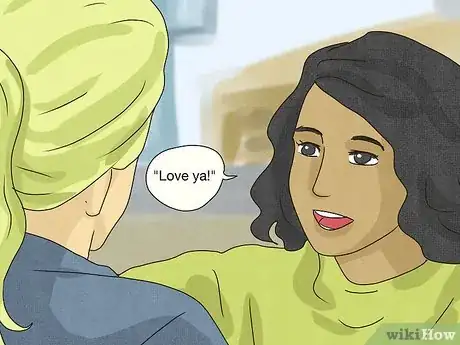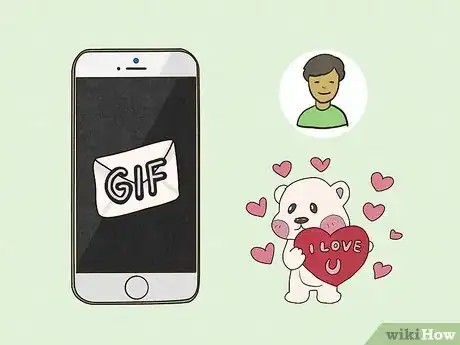This article was co-authored by wikiHow staff writer, Kira Jan. Kira Jan earned her B.A. in English from Stanford University in 2021. She has published work in a variety of literary magazines and edited for bestselling authors. Kira now writes and edits for the content team at wikiHow with the goal of reaching audiences of all backgrounds, skillsets, and interests. She enjoys continually learning alongside wikiHow readers and working to create connection through the written word.
There are 10 references cited in this article, which can be found at the bottom of the page.
This article has been viewed 31,010 times.
Learn more...
You often hear about “rules” for when and how to say “I love you” in romantic relationships, but how do you say that to a friend? Moreover, how do you make sure your friend knows you love them in a strictly platonic way? Especially if you and your friend don’t talk about feelings a lot, it might feel awkward to jump in there and say “I love you” (though if that’s your style, do it!). In either case, we’ve got you covered with our top list of ways to let them know how much you love them while keeping things genuine and comfortable.
Steps
Add a casual nickname.
-
Use a term of endearment to make it clear it’s platonic.[1] X Research source While it’s perfectly fine to just say “I love you,” you can add a word like “girl,” “bro,” or “dude” if that makes you feel more comfortable. If you have a silly shared inside joke or nickname, feel free to add that, too. After all, nicknames are signs of admiration and affection.[2] X Research source
- “I love you, girl!”
- “Dude, I love you.”
- “Hey, Smarty Pants! I love you.”
Abbreviate “I love you.”
-
Ditch the “I” or turn “you” to “ya.” Take down the intensity of “I love you” by shortening the phrase a little. It might feel more natural to say in conversation, and you still get to express how you feel.[3] X Research source
- Say “Love you!” as you leave after hanging out.
- Text “ILY” or “I luv u!” or “Love u!” or “Love ya!”
Add the word "friend" into the conversation.
-
Avoid misunderstanding by clarifying how you see them. Just saying “I love you” can feel a little intense, and you might be worried about it sounding romantic. To keep things platonic and set a boundary, pair your heartfelt statement with a nice comment about what their friendship means to you.[4] X Research source
- “I love you, Kendra! Your friendship means so much to me. I wouldn’t have gotten through Ms. Mack’s algebra class without you.”
- “You are such a good friend, Danny. I love you!”
- “I’m so glad we became friends. I love you.”
Just say “I love you.”
-
It’s okay to directly let them know you love them without caveats! If you’re concerned about keeping things platonic, just pick a neutral moment to say it.[5] X Trustworthy Source Go Ask Alice Medical advice site with content written by health promotion specialists affiliated with Columbia University Go to source For instance, if you’re worried about coming off too romantically, you might want to avoid saying it while staring deeply into their eyes under the stars, while slow dancing, or while watching the sunset on the beach. Here are some examples of platonic situations where saying “I love you” is definitely appropriate:
- Your friend is leaving for a trip or a long drive.
- Your friend is sharing a major life milestone or achievement with you (ex. graduation, becoming a parent, getting a job).
- You haven’t seen your friend in a while.
- You’re thanking your friend for doing something for you (ex. bringing you a snack, giving you a ride, picking you up from the airport).
Send a picture via text.
-
Let a GIF do the talking or pair your message with an emoji. Since it’s tough to judge tone over text, keep it light and platonic with something a little over-the-top or silly. Bonus points if you pick a GIF with a reference to a show or character/celebrity you both like. For heart emoji fans, opt for a non-traditional color like blue, green, or yellow to play it safe, and red or pink if you’re all about spreading the love and want to shout your love for your friend from the rooftops.[6] X Research source
- Find a GIF of cute animals being friends and send it with an “I love you” text.
- Pick a GIF that has “I love you” for a caption.
- Send “I love you” and pair it with an animal emoji or random emoji to keep things from seeming flirty or romantic. Feel free to send a kissy face emoji or heart emoji if you’re not worried about it being misinterpreted.
Let them know they’re like family to you.
-
Does your close friend feel like a sibling to you? Include them in your “fam” by expressing that you love them and letting them know they're a part of your chosen family.[7] X Research source Talk about your shared history together and the ways they’ve supported you over time. Use familial language to set boundaries, too, and clarify that your relationship is platonic.
- “I love you, fam. You’ve really been there for me in some tough moments.”
- “You’re like family to me, I love you.”
Describe the impact they’ve had on your life.
-
How has their friendship shaped who you are? Indirectly let them know you appreciate them by telling them exactly how their presence has mattered in your life. Choose to add the phrase “I love you” if it feels right, but if you don’t add it, this is still a great way to express deep appreciation.[8] X Research source
- “I don’t know that any other teammate has had as big of an impact on my life as you have. Your friendship has made me a stronger, more compassionate person.”
- “Because you’ve been my friend and supported me, I felt really loved this past year, even though it was really tough for me.”
Explain why you admire them.
-
Tell your friend why they’re a role model for you. Which of their qualities do you aspire to have? What have you seen them do that’s inspired, moved, or transformed you?[9] X Research source
- “Micah, I hear about the way that you care for your patients, and your selflessness inspires me to try and help others.”
- “I really admire how you’ve worked your way up to floor manager. You’ve got a killer work ethic.”
- “One day, I hope I’ll be as good of a surfer as you. You’re my inspiration.”
Perform small acts of kindness.
-
Help them out with a task to show love. Surprise your friend by offering them a ride, bringing them a meal, or doing a task they don’t like doing. Either do the task by yourself, or help them tackle it so that it becomes a team event. Giving your time and energy can be one of the best ways to say “I love you"–especially if you're not super comfortable expressing that verbally.[10] X Research source
Support them through the good and bad.
-
Let them know you believe in them and why. Even if they’re not currently struggling, it’s okay to show them you love them by telling them what a rockstar they are! Describe how they've succeeded in the past and the qualities that you know will make them successful.[11] X Research source
- "I really believe in you and I know you're going to crush this event because you're so fast."
- "I'm here for you, and I know you'll get through this. You're so tough!"
Give thoughtful compliments.
-
Praise their accomplishments, personality, and whatever else makes them special! Add “I love you” if it feels right, or just let your little statements of appreciation express how much you love them. Worried about coming on too strong? Chances are, your friend will appreciate whatever nice thing you say. But if you’re still worried, just avoid compliments about their appearance to dodge the romantic atmosphere.[12] X Research source
- “You’re always the life of the party.”
- “I love your outfit today. But I also love you.”
- “You’re an incredible singer.”
Clarify what you mean if they take it the wrong way.
-
Keep the conversation casual and kindly correct your friend. If your friend misinterprets your platonic "I love you" as romantic, it can be a little awkward. They might feel uncomfortable, or they might actually have feelings for you and get their hopes up. If they're just uncomfortable with the sentiment, let them know your feelings are platonic and move the conversation along. If your friend has feelings for you, be gentle and kind as you explain that you don't feel the same way.
- "Hey, I meant that in a friendly way."
- "I really care about you, but I meant what I said in a platonic way."
- "I think you're amazing. I only see you as a friend, though."
You Might Also Like

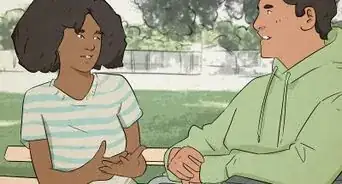 Signs Your Ex Will Eventually Come Back
Signs Your Ex Will Eventually Come Back


 What Are the Bases in a Relationship? Defining the Baseball-Sex Metaphor
What Are the Bases in a Relationship? Defining the Baseball-Sex Metaphor
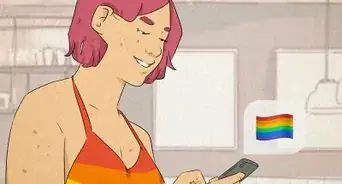 The Top Emojis a Girl Will Use if She Likes You
The Top Emojis a Girl Will Use if She Likes You
 How to Tell if Your Girlfriend Is Horny: 12 Signs She's Turned On
How to Tell if Your Girlfriend Is Horny: 12 Signs She's Turned On
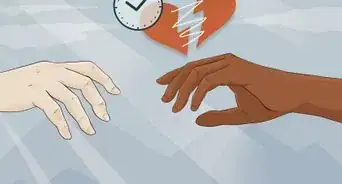 What to Do When Your Girlfriend Is Mad at You (10+ Steps to Take)
What to Do When Your Girlfriend Is Mad at You (10+ Steps to Take)
 12+ Texts to Send Your Girlfriend After a Fight: Apologies & More
12+ Texts to Send Your Girlfriend After a Fight: Apologies & More
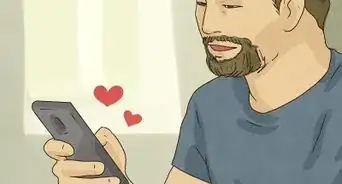 How to Have Phone Sex with Your Girlfriend
How to Have Phone Sex with Your Girlfriend
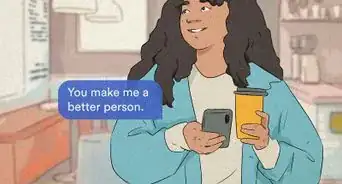
 12 Ways to Break a Narcissist's Heart
12 Ways to Break a Narcissist's Heart
 33 Sweet & Romantic Apology Messages for Your Love
33 Sweet & Romantic Apology Messages for Your Love
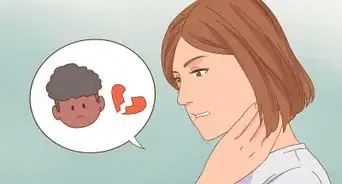
References
- ↑ https://www.cosmopolitan.com/style-beauty/fashion/news/a11159/why-guys-call-girls-dude/
- ↑ https://blogs.scientificamerican.com/mind-guest-blog/why-do-we-use-pet-names-in-relationships/
- ↑ https://licensedmentalhealthcounselor.org/2014/10/23/i-love-you-versus-love-you-is-there-a-difference/
- ↑ https://www.youtube.com/watch?v=YU6h11lOL10&t=129s
- ↑ https://goaskalice.columbia.edu/answered-questions/loving-confusion-it-okay-love-same-sex-friends-and-say-so
- ↑ https://www.cosmopolitan.com/sex-love/a28635219/heart-emoji-meanings/
- ↑ https://www.psychologytoday.com/us/blog/being-unlonely/201906/finding-connection-through-chosen-family
- ↑ https://msw.usc.edu/mswusc-blog/60-ways-show-someone-you-care/
- ↑ https://msw.usc.edu/mswusc-blog/60-ways-show-someone-you-care/
About This Article


